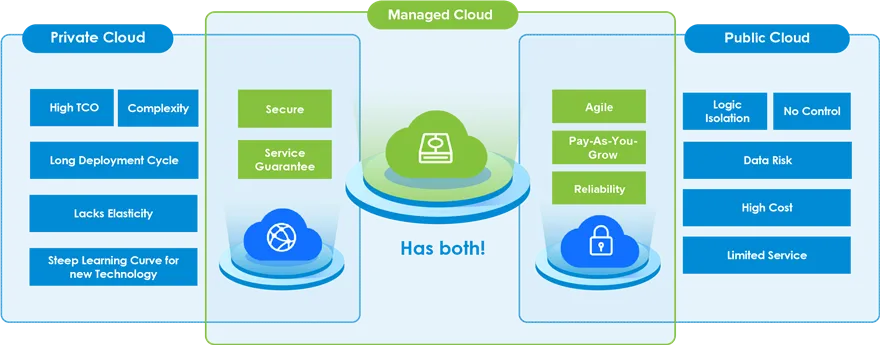With the advancements in adopting cloud technology, enterprises are taking up the mantle of strategising the management aspects of it. But to manage the cloud optimally, businesses need additional help from subject matter experts. And that is where the cloud managed service provider comes into play.
Businesses enlist the help of cloud MSPs to handle all major responsibilities of their cloud management. As the cloud is still a new and fresh technology yet to be explored efficiently, businesses are required to invest time in understanding its implementation. But, with all of the core operations already in action, learning and growing with the new technology might put a halt on a lot of business processes. And compromising cloud management will also result in catastrophic repercussions for the enterprise. Therefore, the easy way out of this conflict is to hire a professional MSP for cloud management. To help you better understand the efficacy of cloud-managed services, here is a detailed guide to the entire approach.
Contents
Understanding Managed Cloud Services
Managed cloud services are work operations executed by a third-party firm upon complete or partial management of cloud resources that are being used by clients or their business infrastructure.
Some of the cloud management responsibilities that the MSPs take care of are cloud infrastructure set up, migration, security, maintenance, and optimisation. All of these services undergo tailored design in order to enable organisations to maximize the benefits of cloud services. Thus, it will help businesses save a lot of time and money by implementing internal management.
There’s feasibility for businesses to access managed cloud services for hybrid, private, and public clouds. The enterprises are required to hire cloud-managed service providers before the migration process begins. It is because a mentor or management guide is essential to helping the business understand what cloud resources are optimal for their specific needs. Moreover, the configuration also needs to be implemented correctly before deployment or migration, which the MSPs are keen to look after.
The managed cloud providers will be connected to the cloud resources to offer subscription-based services. Organisations can consider hiring them as a supplement to their in-house cloud management team or as a replacement for them. With them by your side, your business will be using the best potential of cloud infrastructure to meet its end goals or objectives.
The MSPs also offer cloud computing management services, in which the experts will be looking after updating, troubleshooting, and maintaining the cloud infrastructure 24/7. Thus, they will be able to identify all of the possible cloud-related concerns before they worsen and trouble your organisational workflow.
Some of the services that a cloud MSP cares to offer to an organisation are:
- Cloud deployment
- Cloud Security
- Network and storage management
- Cloud Monitoring and Reporting
- Backup and Disaster Recovery
- Set-up of infrastructure
- Business Continuity
- Cloud Migration Services
Special Functionalities that Managed Cloud Service Providers Take Care Of

Figure 2: Efficacies of Managed Cloud over Public and Private Cloud
Image Source: sangfor.com
Some of the functionalities that the managed cloud service providers offer alongside their partnership plans with your firm are:
1. Cloud security
As IP theft is an intense problem in the business world, breaches are costing companies heavy losses. The decision-makers of all companies have now decided on implementing high-end security for their organisation, to overcome the vulnerabilities. Secure cloud service deployments with proper security measures are of utmost importance. It is to ensure you are utilising the data capabilities better.
A specialized cloud security managed service provider plays a critical role in ensuring the secure usage of cloud services for an organization. They provide a range of services, including monitoring, analysis, and response to security threats, as well as implementing and maintaining security protocols to safeguard against potential breaches. By leveraging the expertise of managed service providers, organizations can minimize their security risks and confidently run their operations in a secure environment.
Read More: Cloud Security Solution
2. Building an Efficient Cloud Strategy
There are ample cloud services available for SMEs (small and medium enterprises). To ensure proper implementation of them all, businesses will need a partner to integrate cloud options that are compatible with their industry.
Picking the right set of cloud solutions and developing a strategy are of utmost importance in the IT world. Hiring reputed, well-managed cloud services will ensure the current and future needs of your organisation are met by utilising the best-fit cloud technology from the best vendors.
Moreover, the clients also have the flexibility to switch vendors over time as the business evolves. Managed cloud service providers will develop a proper blend of hybrid, private, and public clouds that will satisfy the needs of your business and support its growth potential.
Read More: A Beginner’s Guide to Cloud Platform-as-a-Service
3. Providing Data Transition
The usage of data has stupendously increased in the past decade, and organisations are looking out for modern technologies to help themselves stay competitive. The company’s officials are counting on managed services to implement the cloud and understand the data ecosystem better.
In this way, the organisation will be sure of the location of data, its accessibility, and other such aspects. An MSP will be migrating the cloud to a reputed or reliable data centre, as part of the overall data transition.
The professionals make sure that the transition remains smooth and that all components stay in working order. All of the risks are assessed in detail to reduce any possible inconvenience.
Read More: Evolution of Data Centers to Keep Pace
Benefits Associated with Managed Cloud Services
Opting for managed cloud services is often inexpensive in comparison to hiring an in-house management team. But, apart from cost-effectiveness, there are ample benefits that you can acquire by letting professionals handle your cloud deployments, which include:
Robust and reliable infrastructure
A team will be available to support you round-the-clock and help you build a stable network infrastructure. Following that, they will also provide you with consistent infrastructure support through monitoring, scanning, reporting, updating, integrating, and aligning the network operations with core business objectives.
Centralised applications services
All of the applications and services will be managed from a centralised data centre. Thus, it enables organisations to provide enhanced productivity, remote data accessibility, proper storage, backups, and resource utilisation.
Proper data safety and recovery
The cloud-managed services ensure the safety of the data by enabling regular backups and faster recovery for all cloud applications and services. Hence, this is the core business objective, and cloud MSPs look towards making it happen.
Faster response time
Cloud-managed service providers will take up the mantle of providing faster responses to any issue within the organisational network. Thus, it will save you a lot of effort and valuable time.
Timely maintenance and updates
Cloud MSPs offer easy maintenance services to ensure better savings for the organisation. Moreover, the professionals will also ensure your cloud applications or services continue to perform seamlessly. Apart from that, the data centre updates are also taken care of based on timely technologies.
Conclusion
Managed cloud services ensure optimal value addition, which enables organisations to gain practical benefits from them. Starting from data deduplication to managing cloud security, MSPs look after almost everything. The business will improve with every step, and transparency will be maintained between clients and the service providers. With this, business owners can finally concentrate on the essential aspects of operations while leaving the backend to the cloud MSPs.
If you want to learn more about professionally managed cloud services, then check out STL’s Global Managed Services right away!
Frequently Asked Questions
BaaS takes up the responsibility of backing up the business files, hard drives, SaaS apps, and business folders regularly and automatically. The backups are stored in a remote and secure cloud-based offsite data centre. BaaS is quite easy to manage compared to the other storage options. The IT admins now have the liberty to offload management and maintenance operations to a cloud MSP.
The cloud MSPs will be on the front lines, dealing with all the potential cloud vendors associated with your business. In the case of any issue, they take up the responsibility for dealing with the problem and make recommendations to automate specific processes. Thus, cost control measures will be initiated.
When choosing a cloud-managed service provider, there are a few things you need to consider to ensure optimal productivity results, which include:
1. Total expertise and valid certifications
2. Proper workflows and tooling
3. Better control and transparency
The pros and cons of hiring a cloud MSP are as follows:
Pros:
1. Proper resource optimisation
2. Cloud service integration
3. Flat and predictable spending














